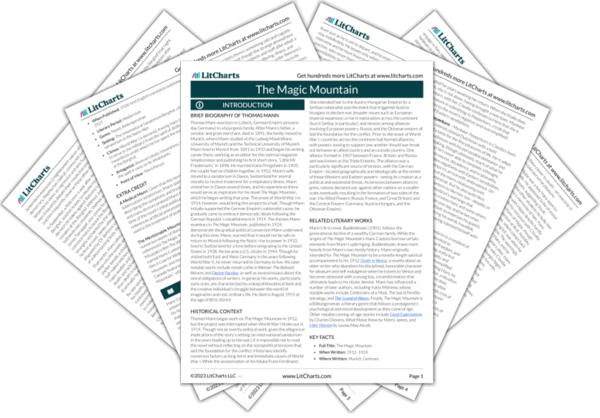Summary
Analysis
Sometime after Peeperkorn’s death, Behrens approaches Hans, noting how “bored” and “jaded” Hans seems. He explains that something is odd about Hans’s case—his improving “localized condition” doesn’t quite match his ongoing “symptoms of intoxication.” The narrator adds that Behrens is quite right about Hans’s apparent boredom. Indeed, Hans has been out of sorts ever since Peeperkorn’s death and Clavdia’s subsequent departure. In her place, Hans has been gripped by a demonic force—and its “name [i]s Stupor.”
With Clavdia gone, Hans no longer has even a flimsy reason to stay at the Berghof, and he becomes “bored,” “jaded,” and indifferent to existence altogether. At the same time, he is too “intoxicat[ed],” or emotionally sedated, to remove himself from the Berghof and all the destructive effects it has on his emotional wellbeing. Hans continues to demonstrate his irrationality and his inability to learn from his mistakes and pull himself out of his “Stupor,” staying in a place that is clearly not good for him, even when his improving “localized condition” gives him the justification he needs to leave the Berghof and return to ordinary society.
Themes
Meanwhile, Hans isn’t the only one bored at the Berghof. Many other residents, as is customary, take up tedious little hobbies to help pass the time. Some of them turn to amateur photography, others collect stamps, and quite a few take to sampling exquisite chocolates. Watching the sanatorium’s many solitaire players makes Hans feel especially sad, but he nevertheless begins to play it all the time.
That other residents take up tedious little hobbies shows that Hans’s “Stupor” isn’t all his fault—it’s a side effect of living in the dulling, intoxicating atmosphere of the Berghof for so long. Yet although Hans acknowledges the deep sadness of the place and its people, he still refuses to act on that knowledge, begrudgingly playing tedious, stupid games as though someone is forcing his hand—when in fact he has (and always has had) the liberty to leave if he feels like it.
Themes
One day, Settembrini stops by the sanatorium and pays Hans a visit. Hans, characteristically, is in the middle of a game of solitaire. Settembrini looks at Hans, a mournful expression in his eyes, and tells Hans it’s clear Hans is in denial about his inner malaise. Settembrini walks away then, but Hans can’t manage to pick up his card game again—he is at once gripped by the presence of “the grinning demon” that rules over his world: “The Great Stupor.”
This is one of the rare occasions in which Settembrini manages to get through to Hans: it seems that Settembrini’s mournful expression has triggered Hans’s awareness of “the grinning Demon” that controls him. Of course, while Hans’s “Great Stupor” may have risen to new heights after Clavdia’s departure, what Hans doesn’t seem to realize is that he has been in a crippling state of malaise for quite some time now—for at least as long as Settembrini has urged Hans, in vain, to leave the Berghof and return to his life in the flatlands.
Themes
Sometime later, Behrens takes samples from Hans’s blood to see if any cocci—the possible cause of Hans’s lingering temperature—will grow. Some cocci do appear on one of the petri dishes, but not that much. Eventually, though, a lot more cocci develop, and Behrens decides to start Hans on a course of Strepto-vaccine therapy, which comes with no risks (the serum is developed from Hans’s own blood). In the worst case, the therapy will do no harm. And so, it’s decided that Hans will remain at the Berghof awhile longer. Hans undergoes treatment for several weeks, and nothing happens. Hans remains at the Berghof and continues to play solitaire. Meanwhile, he feels a creeping dread that “the demon” will soon “come to some horrible end.”
It's likely that Behrens only performs the cocci experiment to humor Hans—in truth, this strain of bacteria exists in all humans, so it’s really not indicative of any serious, underlying problem that the cocci develop in the petri dishes. Yet Behrens, apparently sensing that Hans wants some reason to justify his indefinite stay at the Berghof, goes along with the test and orders Hans to remain at the sanatorium. Hans’s willingness to go along with this phony prescription despite his new awareness that his inner malaise (“the demon”) is slowly destroying him signals his continued resistance to learn from his mistakes. He knows that staying at the Berghof is slowly destroying him, yet he can’t translate that knowledge into practical action.
Themes
Get the entire The Magic Mountain LitChart as a printable PDF.













